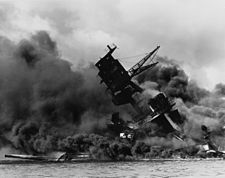A secondary source is therefore an interpretation of an interpretation. A writer or editor or compiler of secondary documents, such as text books and articles, interprets the facts as related by the primary documents and the examination of several primary documents yields an interpretation of several points of view, sometimes conflicting points of view.
Using the above example of Pearl Harbor, the secondary writer could have gathered the letter written from Hawai'i and a first hand account of a Japanese submarine sailor and made a comparison of the two to create an interpretation of what the attack on Pearl Harbor was like from both sides using only two perspectives.
 |
| Leopold von Ranke. One of great minds in the discipline of history, indicated we should try to write history as it actually was, which was an actual revolution in historical practice at the time. |
The challenge becomes trying to interpret in a manner that is true to what actually happened, "wie es eigenlich gewesen" as Saxon-German historian Leopold von Ranke originally stated. The problem with history is that perception is not necessarily the truth, or what actually happened. It does not always take into account a wider understanding but a subjective and limited one, like a single account of the Pearl Harbor attack does not have a wide understanding of the event. Since we cannot totally trust the perception, intention, and ability of the writer, either primary or secondary writers, to convey all their perceptions accurately, truthfully, and honestly, interpretation of what can be known is truly the only option as a matter of course. It is because of this that the conclusion is history must be interpretation.
Tilden Freeman's principles of interpretation: "Any interpretation that does not somehow relate what is being displayed or described to something within the personality or experience of the visitor will be sterile" and "Information, as such, is not interpretation. Interpretation is revelation based on information. But they are entirely different things..." illustrate this point. If a historical narrative intrigues a reader with the premise, idea, concept, topic, or story, the reader will likely read the narrative to satisfy that intrigue. If it is written poorly, they may find something else to do, but if it does satisfy the intrigue, then the reader will find meaning in reading the narrative and be better for it. This next comment will need more exploration than can be allowed here, but the classic writing style of historians and ivory tower academics does not appeal to the general public; they write to impress other historians. Rather, journalists and professional writers often make better historical narratives because they have learned to write to sell and appeal to the public. One of those selling points is making the content meaningful to the reader, sometimes in the form of excellent narrative style, or presentation of the content in such as way that the reader gains meaning from reading. Therefore, history is interpretation.
The academic takes the raw factual information and make it meaningful to other academics while other writers take the same raw factual information and turn it into a best-selling book or landmark article. The raw facts do not speak for themselves. Objects and artifacts are the same way. Facts, objects, and artifacts must be arranged so that information is made meaningful or useful to the reader or the visitor. So whether one is an prestigious academic or a minimum wage interpreter, both are interpreting facts and making them meaningful to their respective audiences. It is because of this that the conclusion is again stated, that history is interpretation.

